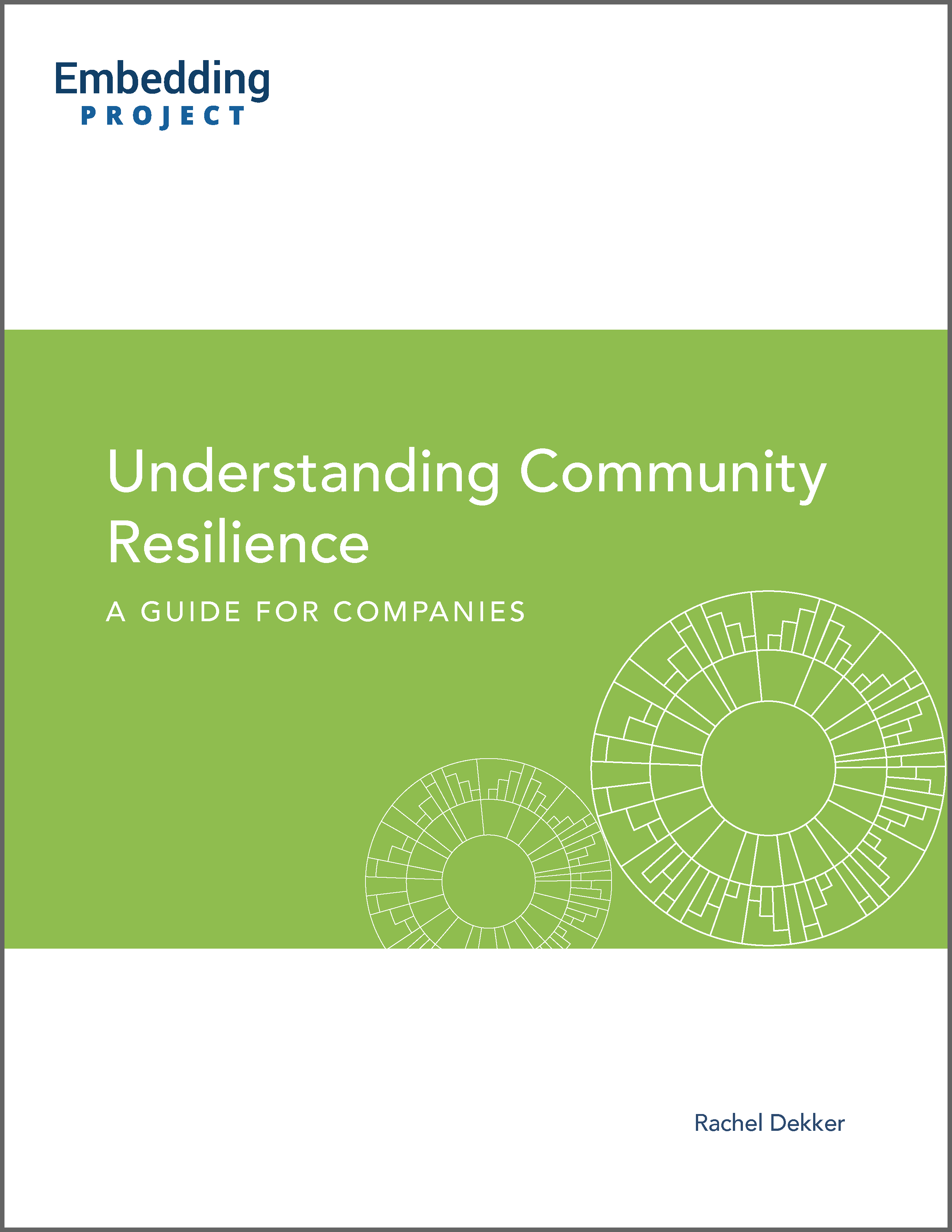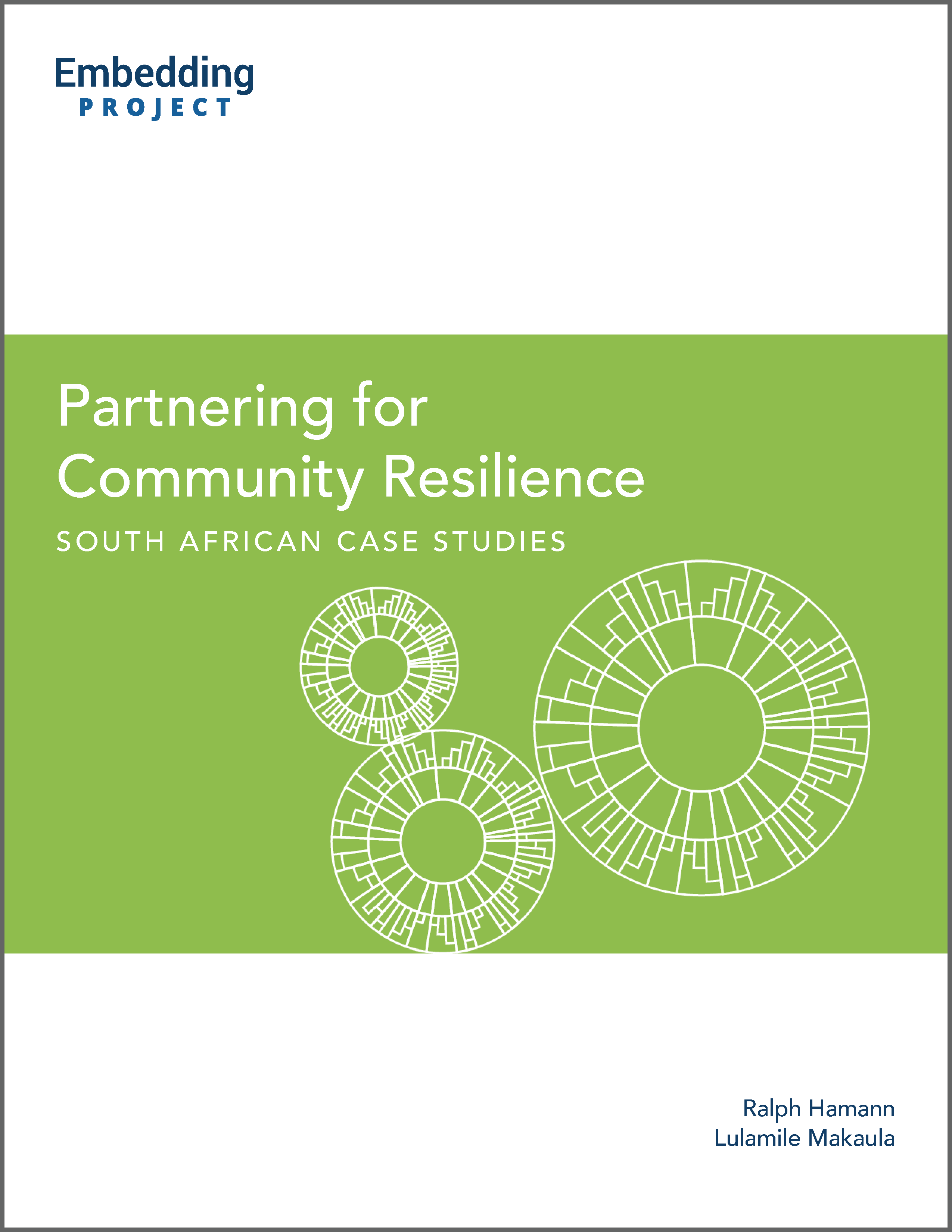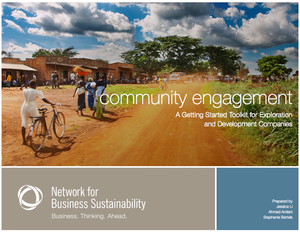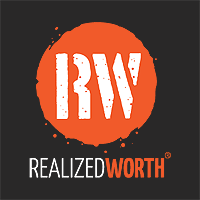Invest in Communities
Description
These resources will help you to support the health and well-being of the communities where you operate or that you indirectly affect, such as by identifying their unique needs, contributing necessary resources and expertise, and encouraging and enabling employees to do the same.
Share this Practice on:LinkedIn
Resources
Community Resilience
Understanding Community Resilience
The success of a company is directly linked to the resilience of the communities where it operates, as well as the resilience of the communities of its workers, its suppliers, and its customers. Increasingly, communities around the world are starting to contemplate their resilience and long-term sustainability. As a result, companies are expected to account for their impacts on community resilience. This guide will help you to understand why community resilience matters, how communities are beginning to approach resilience, and how your company can explore its role in fostering community resilience.
Seven Principles for Partnerships with Frontline Communities
This set of principles from B Lab can help you understand how to build mutually beneficial and equitable partnerships with local communities. It is based on seven principles that came out of a co-creation process involving B Corp employees and community leaders. These principles include centering trust and transparent communications; centering local wisdom and perspectives; committing to equitable resource allocation; prioritising racial and cultural literacy; centering conflict acknowledgement and trust regeneration; co-developing clear and equitable decision-making processes; and centering long-term and sustainability commitments to best ensure collective survival. These principles will be most useful to community relations practitioners and anyone else involved in work that impacts communities, such as supply chain management, sustainability, and project management teams.
Partnering for Community Resilience: South African Case Studies
Proactive companies are recognising the strategic relevance of community resilience to their short- and long-term success. Community resilience is a positive dynamic between social, economic, and ecological systems that ensures community wellbeing and effective responses to shocks and disruptions, such as fires, droughts, or economic crises. This guide shares five in-depth case studies of companies engaging in partnerships for community resilience in South Africa. We distil the key lessons from these case studies for corporate managers who are planning or implementing partnerships for community resilience.
Community Engagement
Social & Human Capital Protocol
Developed by WBCSD and launched by the Capitals Coalition, the Social & Human Capital Protocol is an excellent starting point for recognising and leveraging people and relationships as drivers for sustainable growth. Divided into four steps (Frame, Scope, Measure & Value, and Apply), the Protocol aims to clarify best practices, boost the positive impacts of business, and improve business credibility by integrating the consideration of social impacts and dependencies into performance management and decision-making. The Social & Human Capital Coalition has also developed case studies, sector guides, and a toolkit to complement the Protocol.
Beyond Inclusion: Equity in Public Engagement
Inclusion is integral to ethical and effective public engagement. Hearing from people with diverse lived experiences leads to more innovative ideas, better decisions and stronger democracies. However, many groups of people remain under-represented in engagement processes due to systemic barriers and inequities.
Beyond Inclusion: Equity in Public Engagement proposes eight principles to support the meaningful and equitable inclusion of diverse voices in public engagement processes across sectors. The principles are also applicable
Community Engagement – A Getting Started Toolkit for Exploration and Development Companies
This community engagement toolkit offers practical guidance and in-field engagement support that will help you to build relationships with communities. The tools include a template to track engagement, sample maps to help assess your area of influence (AOI), and a checklist and feedback form to supplement your stakeholder analysis. While the guidance is specific to practitioners in the field of materials extraction, most of the tools - which can be downloaded separately - should be useful to practitioners doing stakeholder engagement in any industry.
Unite to Ignite: Accelerating the transformational power of partnerships for the SDGs and beyond
The Sustainable Development Goals are in deep trouble. Only 12% of the 140 targets set in 2015 are on track to be met by 2030. The Partnering Initiative and others have launched the “Unite to Ignite” campaign to address this lack of progress, calling for systematic collaborative action between the public and private sectors. As part of the campaign, this report can help you understand how you can support your organisation to engage in multi-stakeholder partnerships. Based on a study of the barriers to collaboration, it finds seven key enabling factors needed to unleash partnership at scale, including individual competencies, organisational structure, trust building, and financing options. This guidance will be most useful to sustainability practitioners and supply chain managers seeking to implement multi-stakeholder partnerships.
How to Build Good Relations with Indigenous Peoples: An Interview Series (Part 1)
In our conversations with companies around the world, we have noticed a common refrain: building good relations with Indigenous Peoples is essential, but we aren’t sure how or where to start. This is the first entry in a three-part series that aims to help bridge this gap. In this instalment, we unpack the importance of understanding Indigenous worldviews, taking the time to understand the needs of their Peoples, and acting with deference and sincerity towards building positive and long-lasting relationships in order to advance reconciliation.
How to Build Good Relations with Indigenous Peoples: An Interview Series (Part 2)
In our conversations with companies around the world, we have noticed a common refrain: building good relations with Indigenous Peoples is essential, but we aren’t sure how or where to start. This is the second entry in a three-part series that aims to help bridge this gap. In this instalment, we discuss some of the specific actions that your company can take towards embedding an understanding of Indigenous worldviews into how you operate and your approach to building capacity with Indigenous communities.
How to Build Good Relations with Indigenous Peoples: An Interview Series (Part 3)
In our conversations with companies around the world, we have heard a common need: How do we build good relations with Indigenous Peoples? This third and final post in our series aims to help bridge this gap. We partnered with Chief Leanne Joe to identify resources that help you understand Indigenous truth-telling, systemic discrimination, and highlight essential business practices that can help you build long-lasting relationships founded on trust and respect.
What is Skills-Based Volunteering?
This quick primer on skills-based volunteering from Realized Worth will help your organization take a more impact-oriented approach to volunteering. It offers insight into misconceptions about skills-based volunteering, as well as who it's right for and what it looks like in practice.
Community Investment
The B4SI Framework
As businesses shift their focus from philanthropy and donations to strategic investment, a growing number of leaders and sustainability professionals are looking for guidance on how to measure business investment for social impact. In response, the B4SI Framework was created to help businesses understand and measure their contributions to society; strategically assess their community programmes; identify the business benefits of various social impact activities; and to benchmark against others.
B4SI has created a guidebook to put community contributions in context and to explain their three-pillar framework, which consists of inputs (what you contribute), outputs (what happens), and impacts (what changes). The guidebook also provides tools, practical advice, definitions, and examples on how to collect relevant information.
AA1000 Stakeholder Engagement Standard
This standard from the AccountAbility Standards Board can help you understand what good-quality stakeholder engagement is and how to do it. Section 1 outlines the purpose and scope of the standard; Section 2 covers the standard’s accountability principles and how to integrate them across governance, strategy, and management; Section 3 demonstrates how to set the purpose and scope of your stakeholder engagement; and Section 4 explains the four key steps of the engagement process – Plan, Prepare, Implement, and Review. This framework will be most useful to community relations teams and anyone seeking to better understand the perspective and needs of relevant stakeholders.
Strategic Community Investment: A Good Practice Handbook for Companies Doing Business in Emerging Markets
This quick guide from the International Finance Corporation (IFC) can help you to think strategically about how your company can support community investment programs that are successful, sustainable, and consistent with your business objectives. The handbook is organised around seven key areas comprising a comprehensive strategic planning framework for community investment, including assessing the context for community investment; investing in capacity building; and measuring and communicating for strategic advantage.
Although this resource still uses the language of shared value rather than systems value, it is still a good source of information.
Decolonizing Wealth: What If Money Could Heal Us?
This article from Edgar Villaneuva explains how wealth - if distributed fairly - can be used to disrupt rather than perpetuate and exacerbate systemic inequity. Beyond funding priorities and tax code concerns and other critiques, Villaneuva levels his gaze at colonialism and the insidious ways in which it influences philanthopy and wealth management, allocation, and spending. He contends that white supremacy, white saviourism, and internalised oppression are preeminent and problematic throughout giving, lending, and investment decisions, and that these issues must be understood and addressed before equitable contributions to systems change can be achieved. This resource - as well as his book - will help you to understand these issues so that you can provide more equitable access to resources for marginalised and vulnerable communities.
Strategic Philanthropy for a Complex World
When it comes to community investment, often times practitioners take a predictive approach (where we expect A to lead to B and then C). However, this doesn't tend to align with the multi-faceted nature of sustainability issues. This article from the Stanford Social Innovation Review will help you to become familiar with the idea of developing a emergent approach to community investment. It is targeted at philanthropic foundations, but should be valuable for a diverse range of sustainability practitioners.
Freeport-McMoRan: Localising Global Social Investment Strategies
This brief case from Business for Social Responsibility (BSR) demonstrates how mutual benefits can be derived by businesses collaborating with NGOs and communities to explore opportunities for investment. It explores how a non-profit organisation worked with a major mining company to develop a new approach to engaging communities, and helped shift the company's emphasis on investments in philanthropy towards a participatory approach to investments that satisfied both the company's and community's needs.
Other Resources
Global Impact Investing Network
The Global Impact Investing Network (GIIN) was established to champion impact investing and to increase its scale and effectiveness around the world. Impact investments are "investments made with the intention to generate positive, measurable social and environmental impact alongside a financial return."
GIIN is one of the world's leading sources of data and perspectives on impact investing, and they have produced a wide range of publications that can help you to understand, embed, and expand impact investing efforts. These publications include research and reports on the impact investing market; methods for standardising and comparing impact performance; ways to enhance climate change mitigation and gender equality through impact investing; and more. GIIN has also compiled a series of case studies to demonstrate impact investing in action.
Share this Practice on:LinkedIn















